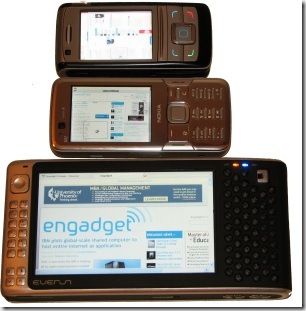Last weekend, Opera made some changes to the Opera Mini servers which have resulted in a speed increase that puts page rendering speed up into the ultra mobile PC bracket. Seriously! I tried it earlier while my daughter was playing on the park swings and was amazed to see Engadget load and render in well-under 15 seconds. I’ve just re-run the tests on a couple of Nokia phones and a Raon Digital Everun to confirm the result.
Nokia N82 – UMTS (350kbps approx) – 12 seconds
Nokia 6280 – Reload Engadget page over UMTS (350kbps) – 12 seconds
Everun – Deep reload Engadget page over WiFi – 15 seconds
Everun – Deep reload Engadget page over UMTS – 25 seconds
Note that there is no such thing as a deep-refresh on Opera Mini. The reload operating pulls everything from the Opera servers as if it was a new page. It’s also interesting that the non-multi-tasking 6280 is as fast as the, relatively powerful, but multi-tasking, S60-based N82. Also note that the antenna on my Everun is fairly weak and is probably responsible for the low data rate on the Everun when connected to a 3G network. Overall though, the two phones win the page load speedtest and page-load speed is the figure that most people, vendors and customers alike, will use as a benchmark.
There’s a whole lot more to a comparison than just page-load times though. Here are some things to think about.
- Navigating a loaded page is slow on any phone. Panning, zooming, choosing and selecting the link takes so much longer than using a real mouse or touch on a 5″ screen that shows around 5 times as much info.
- Reading the information on a QVGA-sized page is harder than on a larger screen.
- The test here was done with the least powerful UMPC. On a WiBrain B1H, one of the cheapest and smallest UMPCs, the same test takes just 7 seconds over Wifi and 20 seconds over a Bluetooth-tethered UMTS phone.
- A ultra mobile PC can also use a proxy service.
- Security. By using a proxy service, all your data is relayed through a single farm of servers.
- Redundancy. If your browser’s proxy farm becomes unavailable, the whole Internet is gone with it.
- Net neutrality. Redirection, content substitution and ad-substitution is not out of the question and probably not out of any usage agreement.
- Some Embedded content will be unusable.
- There is no ability for 3rd parties to enhance the browser with plug-ins.
- Viewing and saving the original images may not be possible.
- The latest html and java techniques, including client-side processing, may not be supported and will limit the ability to run Internet applications.
- Running a real client-side browser on a smartphone is painfully slow.
There some important things to consider in favor of Opera Mini though.
- If you want a single page of info, Opera Mini is, in general, as quick as a UMPC.
- Instant-on. No 5-second wait for a device to come out of standby.
- Smaller screens mean lighter, more pocketable solutions.
- If you want to save data costs, Proxied services are better (In this test only 20% of the data was used compared to the raw web page download.)
- Opera Mini on a 5″, 800×480 touchscreen would solve some of the page navigation issues. (I’d like to see Opera Mini or a similar service on the Nokia Internet Tablets.)
- Proxy and compression techniques will get better.
- Mobile phones always have the data modem. Most UMPCs don’t have it yet.
For the web-consumer, this middle-man technique is developing into a very quick, easy and usable solution and it’s possible that either this technique or the Internet ‘widgets’ technique will be the one that we see on most mobile phones and, possibly, low-end MIDs with cheap data contracts.
Personally though, I’m enjoying having all methods available and I hope that they all find a place on mobile Internet devices. For general browsing when I’m out and about and have some minutes free or have no ultra mobile PC available, I’ll use Opera Mini or a tailored applet but for professional-level work, I’ll use the dedicated mobile Internet device.












I’ve been using Opera Mini on my iMate SP3i for about 2 weeks now and it’s absolutely brilliant. Browsing over GPRS (yes the phone is ancient) is actually pretty quick and the webpage re-formatting feature works quite well.
I’ve even put it on my Axim x30 a few days ago after spending forever looking for a decent J2ME VM. With its infinitely more powerful XScale processor, scrolling is smooth and the zoom animations look great.
Opera Mobile was a huge step up from Pocket IE but Opera Mini 4 is even better. I look forward to Opera Mobile 9.5 but until then, I’m happy with Opera Mini.
If only there was a Windows Mobile J2ME VM which allows full screen operation!
Nice!
Daniel
Opera Software
hi, cool web site and good articles.
The The first step is to learn how to find out what your Internet speed is.The Internet speed is determined by 2 components: the download rate and the upload rate of data which are usually measured in Kilobits per second.
Then after you know the upload and download rate, you can use tools or tweaks to improve your internet speed, or take the decision to change your ISP.